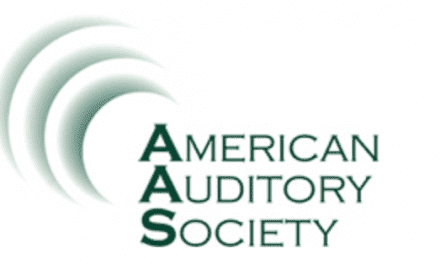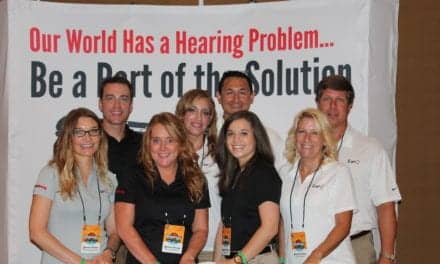Inside the Research | September 2021 Hearing Review
By Douglas L. Beck, AuD
Arlene Pietranton, PhD, has been the CEO of American Speech-Language-Hearing Association (ASHA) since 2004, and was the organization’s Chief Staff Officer for Speech-Language Pathology from 1996-2003, and its Director of Health Services from 1994-1996. Prior to that, she worked at the George Washington University Medical Center in Washington, DC. She now directs a staff of over 300 at ASHA headquarters in Rockville, Md, and recently announced plans for retirement.
Beck: Hi Arlene! It’s been 17 years since our last interview!
Pietranton: Hi Doug! Hard to imagine, but yes! The last time you interviewed me was 2004,1 when I was the new Executive Director of ASHA and you were about to join Oticon.Somewhere around 2010 or so my title was changed to Chief Executive Officer. And of note, you and I have had multiple parallel professional experiences, which have brought us back to this retirement interview!
Beck: Yes, well, to be clear, only one of us is retiring! In fact, you started at ASHA in 1994 and became Executive Director on January 1, 2004—which makes you only the third executive director in ASHA’s almost 100-year history, right?
Pietranton: That’s true. The first was Ken Johnson from 1957 to 1980, and then Fred Spahr from 1980 to 2003, and then me!
Beck: And now you’re getting ready to retire?
Pietranton: Well, the end of 2021 is my target date. That’s the plan for now. I love the people I work with, and I love the work that we do, but it’s time. I want to retire while I still have good health and energy to experience other things in life, to travel, to explore, and to spend more time with family and friends.
Beck: I understand. Of course, I assume ASHA will have to do a national search and they will ultimately locate a few excellent candidates. However, the process will take months, and it’ll be grueling…lots of interviews, negotiations, vetting…and the new CEO will need time to get up to speed—and whoever becomes the 4th ED will have huge shoes to fill!
Your leadership skills are well-honed and highly respected. However, you also have a doctorate in experimental psychology and you have a vast knowledge of communication disorders. I feel bad for the search committee members; their task will not be easy. Additionally, ASHA continues to grow, and simply understanding a group of professionals as large as ASHA is a monumental task!
Pietranton: Thank you. And yes, ASHA has nearly 220,000 members now. About 14,500 are audiologists, about 188,000 speech language pathologists (SLPs), along with thousands of speech-language-hearing scientists, NSSLHA members, and support personnel. Finding the next CEO for this large group of professionals will be an exciting opportunity and challenge for ASHA’s Board.
Beck: I’ve witnessed your patience, dedication, political knowledge, and your ability to navigate difficult waters, and I can say without hesitation, your leadership skills are admirable. From my viewpoint, I think you have often demonstrated the value of surrounding yourself with highly experienced top-notch leaders and decision makers.
Pietranton: I’ve been very fortunate and I absolutely appreciate the amazing opportunities I’ve had. But you’re right: the ability to surround myself with wise and talented people allows for better decision making, as well as the integrated and multi-tiered structure we’ve developed at ASHA. The structure allows me the opportunity to know who can contribute to solve problems and answer questions with readily available subject matter expertise.
Beck: That’s an important point. The history of ASHA and the depth and breadth of its publications from staff and volunteer professionals is tremendous. Speaking of which, it seems the national audiology associations have been more or less pulling in the same direction in the policy arena lately.
Pietranton: Yes, and we’re all delighted to see this. Of course, it’s not a surprise to anyone that, when we are able to work together to support the patients and professionals, good things happen. For example, the national groups came together and created the OTC Hearing Aid Consensus Statement2 published by AAA, ADA, IHS, and ASHA. In fact, I believe you were the lead author of an earlier HIA working group on OTC back in 2016 and 2017 with Dave Fabry, Harvey Abrams, Brent Edwards, and Tom Powers, that also did a deep dive into the OTC issue.3
Beck: I’m not sure how much our original document actually influenced the consensus statement, but your point is well taken that—when we join forces to achieve a goal—the solutions are generally better, and the acceptance of the outcomes is more likely. More recently, we saw similar cooperation this spring regarding the Medicare Audiologist Access and Services Act (MAASA) supported by all the national audiology groups.
Pietranton: The cooperation and unity demonstrated in these actions and initiatives are of critical importance to the profession of audiology, and certainly to the patients and clients audiologists serve. I believe that we’re well-aligned on this issue. We’re working comprehensively, and hopefully, we’ll see MAASA move forward.
MAASA is designed to enhance the Medicare benefit by providing critical direct access to both diagnostic and therapeutic services provided by audiologists. As HR reported, “[AAA, ADA, and ASHA] announced that they support this legislation as a top priority to ensure expedient and optimal hearing and balance health care for the older adult population in the United States.”4
I think we’ve come a long way and we need to maintain the momentum. The cooperation across audiology organizations is wonderful.
Beck: A rising tide lifts all boats. While I’ve got you, I’d like to get your thoughts on cognitive screenings. As you know I publish and lecture quite a bit on the fact that hearing is simply perceiving sound, whereas listening is decoding sound, or applying meaning to and comprehending sound. As such, people can have difficulty understanding speech due to hearing loss and/or listening disorders like auditory processing disorders (APD), auditory neuropathy spectrum disorder (ANSD), cochlear synaptopathy, etc. However, many of us in SLP and audiology are now using cognitive screenings to look deeper at why an individual may have difficulty understanding speech, particularly in noise. So, I’d like to get your thoughts on cognitive screenings with regard to the patients we [SLPs and audiologists] serve?
Pietranton: Sure. First, let me say that you’re one of the primary people I’ve heard who constantly emphasize the difference between hearing and listening, and this is very helpful because many people use hearing and listening as synonyms. They are not synonyms.
We know the entire brain is involved in decoding speech sounds. In fact, in the real world many things impact our ability to listen, such as the emotional impact of the conversation, visually redundant speech cues, body language, the speech signals themselves, background noise, and more. So when people complain of signs and symptoms which cannot be explained by traditional audiometric test results, it makes sense to look deeper.
For example, some 26 million people in the USA have normal audiometric thresholds, yet have difficulty understanding what others are saying in a café or restaurant, or dinner with their friends.5 Others may have a mild hearing loss, yet their ability to understand speech in noise is more consistent with people who have a moderate or severe hearing loss. Uncovering these anomalies is very important, because if the audiologist doesn’t dig deeper, it’s unlikely anyone else will!
And, as you have often lectured, people with dementia, cognitive decline, and many neurocognitive disorders will often present with the exact same symptoms—the inability to understand or to decode speech. Indeed, for many people, a cognitive screening allows the audiologist or the SLP to better understand if the client might benefit from a referral for a diagnostic evaluation. That just makes good sense. The holistic nature of this approach makes perfect sense to me and I couldn’t agree more.
Beck: And just to be clear, we’re talking about no-charge, free, cognitive screenings, which are pass or fail. Further, when one “fails” a cognitive screening, that does not mean the patient has a cognitive issue; it means a referral for a diagnostic test by a GP or professional (eg, psychologist, counselor, psychiatrist, etc) is the next step. It’s much like failing a hearing screening: the failure doesn’t mean you have A, B, or C; it simply means you need a diagnostic test by a qualified licensed professional.
Pietranton: Exactly. And we’ve advocated holistic approaches and other communication disorder-related screenings for decades.
Beck: In fact, almost 38 years ago, before the FDA gave approval for adult cochlear implants [in 1986], I was a researcher at the House Ear Institute in Los Angeles. As part of our research assessment of cochlear implant candidates, I regularly performed visual screenings, as we knew that CI candidates needed to integrate their visual and hearing abilities to understand speech maximally and to take advantage of visual redundancy.
Pietranton: That’s right. This is important because although we each have our areas of expertise, we are dealing with human communication and communication disorders. The more we can comprehensively explore and uncover the primary problem, the more likely we are to better manage it. I might draw a parallel here to audiologists and SLPs working with children who have APD, which is often not about hearing loss, but more about listening and listening skills. In that respect, we screen for APD when a child has difficulty paying attention or following instructions. Then, if a child fails an APD screening, we do a diagnostic test. If the diagnosis is positive, we treat or manage the child with aural rehabilitation, perhaps language therapy, maybe an FM system or other tools to improve the signal-to-noise ratio, and of course, this is all common practice.
Beck: That’s a great analogy. Further, it’s important to recognize that the vast majority of audiologists and SLPs have undergraduate degrees in communication disorders, and so it seems a basic cognitive screening is well within our knowledge base.
Pietranton: That’s a fair point. I think that in a few years, cognitive screening will be a much more common protocol in speech and audiology. I think intuitively, because we are grounded in communication, this is a fundamental issue, and further, early detection and identification almost always leads to better solutions and outcomes.
Beck: Arlene, it is wonderful to speak with you! I wish you joy and good health, and offer you my congratulations on your retirement,. Thank you for your very significant advocacy and contributions to better speech and hearing—and listening!
Pietranton: Thanks Doug. It’s great to connect with you again!
References
1. Beck DL. Interview with Arlene Pietranton Ph.D., Executive Director, American Speech Language Hearing Association (ASHA). April 19, 2004. Available at: https://www.audiologyonline.com/interviews/interview-with-arlene-pietranton-ph-1634
2. American Academy of Audiology, American Speech Language Hearing Assn, Academy of Doctors of Audiology, International Hearing Society. Regulatory Recommendations for OTC Hearing Aids: Safety and Effectiveness. August 2018. Available at: https://www.hearabouthearing.org/wp-content/uploads/2018/08/Consensus-Paper_OTC-HAH-Final.pdf?x18639
3. Beck D, Abrams H, Edwards B, Fabry D. HIA comments on FTC “Now Hear This” Workshop and OTC hearing aids. May 24, 2017. Available at: https://hearingreview.com/inside-hearing/industry-news/hia-comments-ftc-now-hear-workshop-otc-hearing-aids
4. AAA, ADA, and ASHA Announce Support for ‘MAASA’ 2021. March 3, 2021. Available at: https://hearingreview.com/inside-hearing/legislation/support
5. Abrams HB, Kihm J. An introduction to MarkeTrak IX: A new baseline for the hearing aid market. Hearing Review. 2015;22(6):16. Available at: https://hearingreview.com/practice-building/marketing/introduction-marketrak-ix-new-baseline-hearing-aid-market
About the author: Douglas L. Beck, AuD, is the Vice President of Academic Sciences at Oticon Inc, Somerset, NJ. He has served as Editor in Chief at Audiology Online and as Web Content Editor for the American Academy of Audiology (AAA). Dr Beck is an Adjunct Clinical Professor of Communication Disorders and Sciences at the State University of New York, Buffalo, and also serves as Senior Editor of Clinical Research for The Hearing Review’s Inside the Research column.





